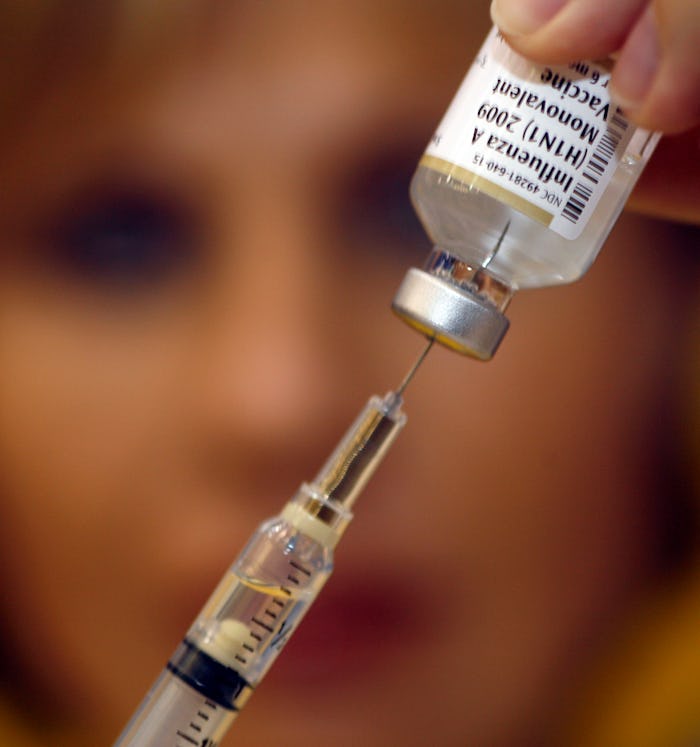Life

A Comparison Of The Presidential Candidates' Views On Vaccines
While there are plenty of myths out there and arguments to be made about vaccinations, the vast majority of Americans seem to support vaccines — and perhaps more importantly, so does the scientific community. Even as the presidential election comes down to the wire debates among the believers and nonbelievers rage on. With that in mind, it’s important to know where the each nominee stands on this controversial issue — and a comparison of the presidential candidates’ views on vaccines shows stark differences between all four of the biggest names in the race.
Some believe that the topic of vaccines simply shouldn’t be up for debate at all because the scientific evidence is clear and, quite simply, vaccines save lives. Vox reported in detail back in August that there’s "no link between vaccines and autism" (one of the biggest arguments currently circulating social media) and that medical experts believe "vaccines are generally safe, although they can cause some rare, typically minor side effects."
Cold weather is here and that means flu season is also about to start. Coincidentally, this time of the year coincides with this year's presidential election, so while voters are deciding which candidate best fits their views and needs, they'll also be deciding whether or not to get the annual influenza vaccination. And although public health experts want everyone to know where they stand and that vaccines are safe, the 2016 White House contenders’ opinions and plans for vaccines in the United States might matter just as much.
Here's where the 2016 presidential candidates stack up when it comes to vaccinations:
Hillary Clinton, Democratic candidate
Democratic nominee Hillary Clinton has been very clear when it comes to her stance on this issues, and she is the only candidate who unequivocally supports mandatory vaccinations. Not only that, Clinton has long been an advocate for childhood vaccines: According to Mother Jones, in 1993 she "spearheaded the Childhood Immunization Initiative and the Vaccines for Children program, which aimed to make vaccines affordable."
Donald Trump, Republican candidate
Republican nominee Donald Trump has cautioned against mandatory vaccinations and has repeatedly claimed that these vaccinations also hurt kids. In 2014, he tweeted that children who get vaccinations end up with autism.
However, Trump hasn't completely disavowed the idea of vaccinations; He says he is "totally in favor" of them, but he has certain specifications. During the second Republican primary debate in September of 2015, he said:
Autism has become an epidemic. Twenty-five years ago, 35 years ago, you look at the statistics, not even close. It has gotten totally out of control. I am totally in favor of vaccines. But I want smaller doses over a longer period of time. Same exact amount, but you take this beautiful little baby and you pump — I mean, it looks like it was meant for a horse, not a child, and we've had so many instances, people that work for me.
Jill Stein, Green Party candidate
Green Party candidate Jill Stein — who is a retired doctor of internal medicine and instructor of medicine at Harvard Medical School — is a bit more skeptical about vaccines than Trump, warning that the corporate influence in the vaccine approval process is something to think about.
She recently told The Washington Post:
I think there’s no question that vaccines have been absolutely critical in ridding us of the scourge of many diseases — smallpox, polio, etc. So vaccines are an invaluable medication. Like any medication, they also should be — what shall we say? — approved by a regulatory board that people can trust. And I think right now, that is the problem. That people do not trust a Food and Drug Administration, or even the CDC for that matter, where corporate influence and the pharmaceutical industry has a lot of influence.
Stein continued to explain that her concerns, along with the public's questions about any medication need be addressed before they're approved for widespread use.
Gary Johnson, Libertarian candidate
Gary Johnson, the Libertarian candidate, firmly said in the past that vaccines should not be mandatory. But, his position has since changed. In an interview with Vermont Public Radio back in August, he said that he now believes that vaccinations should be mandatory and should be handled at the local level.
"It’s an evolution actually just in the last few months, just in the last month or so," he told the radio station about why he changed his position. "I was under the belief that … 'Why require a vaccine? If I don’t want my child to have a vaccine and you want yours to, let yours have the vaccine and they’ll be immune.' Well, it turns out that that’s not the case, and it may sound terribly uninformed on my part, but I didn’t realize that."
The topic of vaccinations isn't just an issue that can win or lose candidates votes on Election Day, but their stances are immensely important to the future of public health. When you go to the polls this November, consider the clear scientific evidence at hand, as well as the varying opinions from the presidential candidates, and make an informed decision.